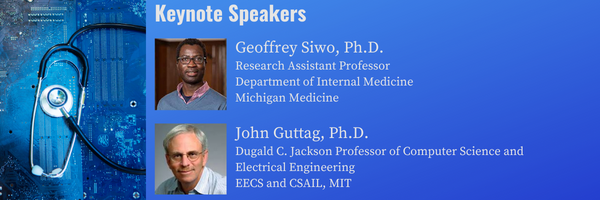e-HAIL Event
e-HAIL Symposium: Artificial Intelligence and Health

Please join us on September 16, 10 am – 3:30 pm, for the first annual e-HAIL symposium, Artificial Intelligence and Health, in the North Campus Research Complex, Building 18, Dining Hall, 2800 Plymouth Rd, Ann Arbor, MI. RSVPs are required for in-person attendance (if prompted, sign into Google using your uniqname @umich.edu), and will help us plan the catering for the event.
The symposium seeks to connect U-M researchers in Engineering and Health-related fields interested in developing innovations in AI inspired by critical problems in health. Accelerating interdisciplinary research collaborations through opportunities for engagement is a major focus of the e-HAIL program in its early development. The symposium therefore prioritizes conversation over presentation, and allows attendees to decide on the agenda and discussion topics of the “unconference” sessions (based on the idea of unconventional conferences, or “unconferences”).
Program
Opening remarks and speaker introduction
Akbar Waljee, e-HAIL co-Lead Convener
(10 – 10:10am)
Keynote 1 – When AI Meets Fundamental Biology
Geoffrey Siwo, Internal Medicine, U-M Medical School
(10 – 11 am)
Coffee break
(11 – 11:30 am)
Unconference sessions
(11:30 am – 12:30 pm)
- NLP Dialog Systems for Behavior Change (Rada Mihalcea)
- Robots and healthcare (Lionel Robert)
- Research with mobile technologies & the goal of a shared data repository (Cathy Goldstein)
- Health Text Data : Pitfalls and challenges (Vinod Vydiswaran)
- Integrating prediction and constrained decision/optimization approaches for healthcare (Mark van Oyen)
- Interpretable AI for health (Alauddin Ahmed)
Poster Presentations and Lunch
(12:30 – 1:30 pm)
- Using Eye-Gaze Data to Augment Surgical Dyads’ Intraoperative and Postoperative Coordination and Instruction (Vitaliy Popov/ Xu Wang/ Jingying Wang)
- Estimating bounds on causal effects under differential measurement error (Maggie Makar/ Dan Clauw/ Pengrun Huang)
- AI/ML methodologies to predict chronic hepatitis B (CHB) disease progression in Africa (Akbar Waljee/ Ji Zhu/ Xianchen Yang/ Yi-Syuan Yen)
- Machine Learning Methods for Assessment of Coronary Artery Disease using Angiographic Data (C. Alberto Figueroa/ Brahmajee Nallamothu/ Ismael Assi)
- The Virtual AppLication-Supported ENvironment To INcrease Exercise During Cardiac Rehabilitation Study (VALENTINE) Study (Walter Dempsey/ Jessica Golbus/ Jieru Shi)
- Facilitating meta-analysis of diabetes research using text classification of clinical diagnoses and outcomes (Deanna Marriott Isaman/ V.G. Vinod Vydiswaran/ Joe Menke)
- Exploratory analysis of misinformative health news about COVID-19 from social media platforms (Veronica Perez-Rosas/ Larry An/ Ruoyao Wang)
- Home/Remote Patient Monitoring Using Simple Respiratory Monitoring Device for COPD Patients & AI Processing for Early Identification of Exacerbations
- (Mohammed Islam/ Janet Larson/ Tianqu Zhai)
- Privacy-Preserving Sensors for the Long-Term Monitoring, Assessment, and Forecasting of Functioning Capabilities of Individuals with Multiple Sclerosis (Alanson Sample/ Anna Kratz/ Yasha Iravantchi)
Parallel sessions: Resources and Support for AI and Health Research at U-M
(1:30 – 2:15 pm)
- “Mentoring” panel: tips for successful AI-Health collaborations” (Akbar Waljee/Rada Mihalcea/Maggie Makar/Erkin Otles
- “How to convert NSF grant applications to NIH, and vice versa?” (Brahmajee Nallamothu/Jenna Wiens/Mike Sjoding)
Coffee break
(2:15 – 2:40 pm)
Keynote 2 – Registering Medical Images Using Networks and Hypernetworks
John Guttag, Dugald C. Jackson Professor of Computer Science and Electrical Engineering, EECS and CSAIL, MIT, introduced by Jenna Wiens
(2:40 – 3:30 pm)
“Machine learning has transformed the field of medical imaging, and innovations from the medical imaging community have greatly impacted other areas of computer vision. This talk will describe recent advances in using machine learning to register (align) medical images. I will first describe VoxelMorph, a learning-based method for deformable image registration. Because it is many orders of magnitude faster at registering volumetric images than then the computationally burdensome optimization-based methods it replaces, VoxelMorph has been widely used since its introduction in 2019. However, like most deep-learning-based models, it’s performance is highly sensitive to the choice of hyperparameter values. HyperMorph, which I will present next, addresses this problem. HyperMorph is a hypernetwork-based learning framework that can be used to rapidly select appropriate hyperparameter values for specific applications, imaging modalities, and subject populations. HyperMorph reduces the computation used for hyperparameter selection from GPU months (or longer!) to GPU seconds–a qualitative change that substantially reduces user as well as computational burden, and enables new kinds of applications.”
Closing remarks, followed by reception
Rada Mihalcea, e-HAIL co-Lead Convener
(3:30 – 4:30 pm)

 MENU
MENU 
